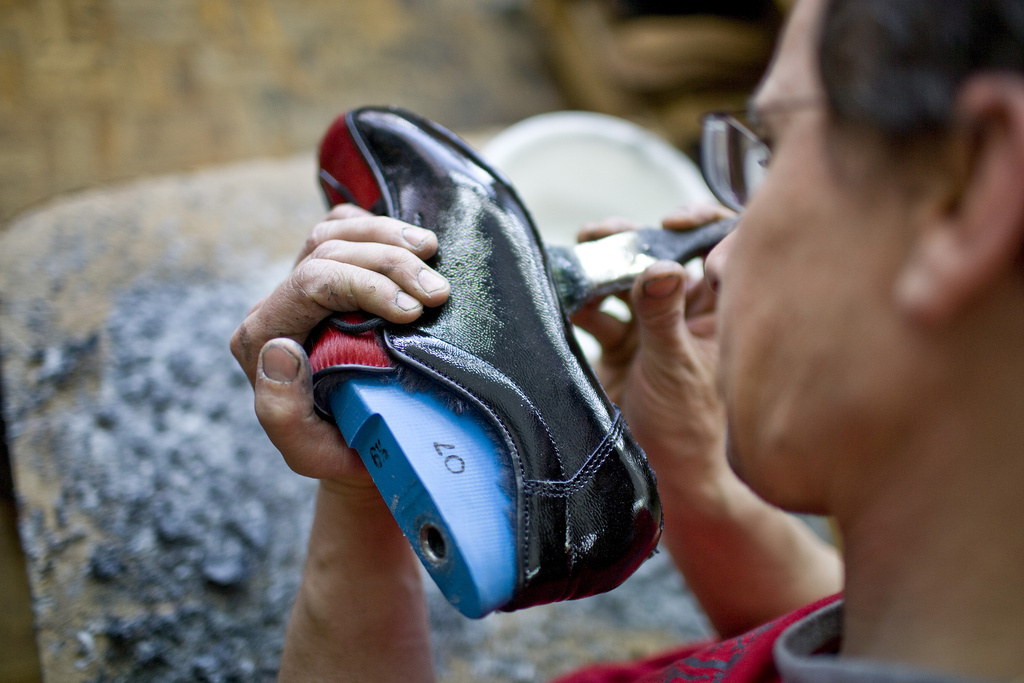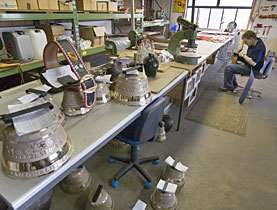Small firms steer course for calmer water

Many Swiss small and medium-sized enterprises (SMEs) are displaying cautious optimism for the coming year despite a rise in the number of company bankruptcies.
A pulse check of smaller firms by UBS banks has shown signs of optimism in some sectors. And the rate of start-ups is beginning to edge up as economic conditions start to look rosier for doing business.
The UBS SME barometer revealed that firms in the industrial and service sectors are confident that turnover will increase in the coming months while the rate of job losses will decelerate.
Firms in the construction, retail and tourism industries are less optimistic, however, as are those that rely on exports to generate sales, the survey found.
But just like their larger peers, SMEs generally expect trading conditions to improve in the first quarter of 2010 given that the downward spiral slowed at the end of last year. It appears that size does matter, but not that bigger is better, according to Rudolf Horber, chief economist of the Swiss SME Association.
Small equals flexibility
“In general, conditions are a bit better for all SMEs, but there are some big differences between companies and sectors,” he told swissinfo.ch. “The broad trend is that micro enterprises [fewer than ten staff] are more robust and flexible.”
“Larger companies have had to make greater staff cuts and life is more difficult for export focused firms.”
The greater manoeuvrability of the smallest firms during difficult times has also been reflected in a recent survey of companies in the machinery sector. Swissmechanic, the umbrella organisation, found that the industry lost 3.2 per cent of its workforce last year.
But companies with 250 employees or fewer had shed on average 1.5 per cent of their workers compared to 5.2 per cent among bigger counterparts.
Improved prospects for the 300,000 or so SMEs should spell good news for the country’s economy, since they account for some 99.7 per cent of all Swiss firms and two thirds of all workers.
But the global recession has left some turbulence in its wake. It is estimated that more than 5,000 companies went to the wall last year, an increase of more than a quarter on 2008.
Winners and losers
Horber believes most of the victims failed as a result of export markets drying up rather than because they had problems obtaining credit.
“Credit problems could have been a factor in some isolated cases, but a survey of our members a year ago showed only two or three companies experiencing problems obtaining loans,” he told swissinfo.ch.
On the other side of the coin, there appears to have been little slowdown in the number of new start-up enterprises.
According to credit ratings agency Dunn & Bradstreet, some 2,754 new firms emerged in January alone, an increase of four per cent on the same month last year.
Venture Kick, a organisation funded by private enterprise to help university research projects spin off into commercial enterprises, said the conditions for new entrants remained positive provided such firms had the right products and a good business plan.
The global recession has not affected the number of spin-off companies from Zurich’s Federal Institute of Technology, which saw 20 enterprises established in 2007, 23 in 2008 and 24 last year.
“There is no simple recipe for making a start-up work, but it is all down to execution of plans,” Venture Kick director Jordi Montserrat told swissinfo.ch. “It is a question of getting close to your customers, surrounding yourself with the right people and driving attention to your product.”
Matthew Allen, swissinfo.ch
A record 5,105 companies of all sizes went bust in 2009 – a rise of 26.7% on 2008, according to credit specialists Dunn & Bradstreet.
The Swiss Credit Association, Creditreform, puts the number at 5,125 – a rise of 23.8%.
The situation got worse in January of this year, with 481 going to the wall (up 38% on January 2009), according to Dunn & Bradstreet.
Switzerland’s industry heavy central plateau suffered more than other regions, with a doubling of bankruptcies in cantons Zurich, Thurgau and Bern.
However, Dunn & Bradstreet also recorded a 4% rise in new companies being founded in January – up to 2,754.
The latest Federal Statistics Office figures showed 11,840 new firms emerging in Switzerland in 2008, signifying a 2% increase from 2007.
SMEs, companies with fewer than 250 employees, make up 99.7% of all Swiss firms. Some 88% have less than 10 workers.

In compliance with the JTI standards
More: SWI swissinfo.ch certified by the Journalism Trust Initiative




You can find an overview of ongoing debates with our journalists here. Please join us!
If you want to start a conversation about a topic raised in this article or want to report factual errors, email us at english@swissinfo.ch.